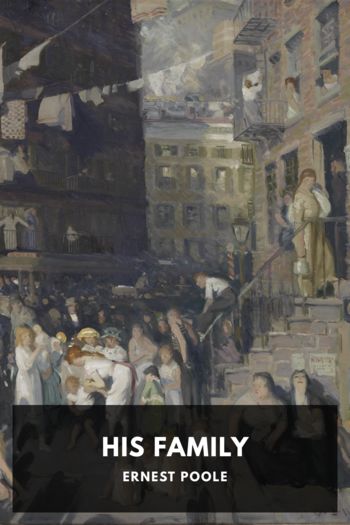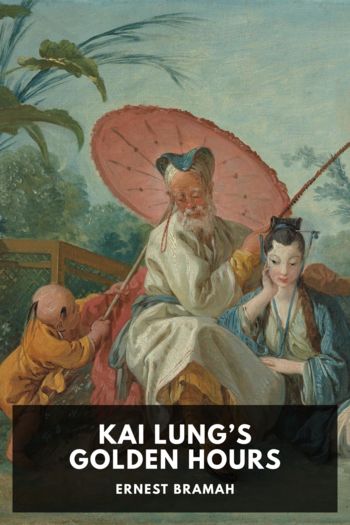His Family - Ernest Poole (ereader for comics .txt) 📗

- Author: Ernest Poole
Book online «His Family - Ernest Poole (ereader for comics .txt) 📗». Author Ernest Poole
“They ought to have children,” Roger said.
“But look at Edith,” his daughter rejoined. “She hasn’t a single interest that I can find outside her home. It seems to have swallowed her, body and soul.” A frowning look of perplexity swept over Deborah’s mobile face, and with a whimsical sigh she exclaimed, “Oh, this queer business of families!”
In December there came a little crash. Late one evening Laura came bursting in upon them in a perfect tantrum, every nerve in her lithe body tense, her full lips visibly quivering, her voice unsteady, and her big black eyes aflame with rage. She was jealous of her husband and “that nasty little cat!” Roger learned no more about it, for Deborah motioned him out of the room. He heard their two voices talk on and on, until Laura’s slowly quieted down. Soon afterwards she left the house, and Deborah came in to him.
“She’s gone home, eh?” asked Roger.
“Yes, she has, poor silly child—she said at first she had come here to stay.”
“By George,” he said. “As bad as that?”
“Of course it isn’t as bad as that!” Deborah cried impatiently. “She just built and built on silly suspicions and let herself get all worked up! I don’t see what they’re coming to!” For a few moments nothing was said. “It’s so unnatural!” she exclaimed. “Men and women weren’t made to live like that!” Roger scowled into his paper.
“Better leave ’em alone,” he admonished her. “You can’t help—they’re not your kind. Don’t you mix into this affair.”
But Deborah did. She remembered that her sister had once shown quite a talent for amateur theatricals; and to give Laura something to do, Deborah persuaded her to take a dramatic club in her school. And Laura, rather to Roger’s surprise, became an enthusiast down there. She worked like a slave at rehearsals, and upon the costumes she spent money with a lavish hand. Moreover, instead of being annoyed, as Edith was, at Deborah’s prominence in the press, Laura gloried in it, as though this “radical” sister of hers were a distinct social asset among her giddy friends uptown. For even Laura’s friends, her father learned with astonishment, had acquired quite an appetite for men and women with ideas—the more “radical,” the better. But the way Laura used this word at times made Roger’s blood run cold. She was vivid in her approval of her sister’s whole idea, as a scheme of wholesale motherhood which would give “a perfectly glorious jolt” to the old-fashioned home with its overworked mothers who let their children absorb their days.
“As though having children and bringing them up,” she disdainfully declared, “were something every woman must do, whether she happens to like it or not, at the cost of any real growth of her own!”
And smilingly she hinted at impending radical changes in the whole relation of marriage, of which she was hearing in detail at a series of lectures to young wives, delivered on Thursday mornings in a hotel ballroom.
What the devil was getting into the town? Roger frowned his deep dislike. Here was Laura with her chicken’s mind blithely taking her sister’s thoughts and turning them topsy-turvy, to make for herself a view of life which fitted like a white kid glove her small and elegant “ménage.” And although her father had only inklings of it all, he had quite enough to make him irate at this uncanny interplay of influences in his family. Why couldn’t the girls leave each other alone?
Early in the winter, Edith, too, had entered in. It had taken Edith just one glance into the bride’s apartment to grasp Laura’s whole scheme of existence.
“Selfish, indulgent and abnormal,” was the way she described it. She and Bruce were dining with Roger that night. “I wash my hands of the whole affair,” continued Edith curtly. “So long as she doesn’t want my help, as she has plainly made me feel, I certainly shan’t stand in her way.”
“You’re absolutely right,” said her father.
“Stick to it,” said Bruce approvingly.
But Edith did not stick to it. In her case too, as the weeks wore on, those subtle family ties took hold and made her feel the least she could do was “to keep up appearances.” So she and Bruce dined with the bride and groom, and in turn had them to dinner. And these dinners, as Bruce confided to Roger, were occasions no man could forget.
“They come only about once a month,” he said in a tone of pathos, “but it seems as though barely a week had gone by when Edith says to me again, ‘We’re dining with Laura and Hal tonight.’ Well, and we dine. Young Sloane is not a bad sort of a chap—works hard downtown and worships his wife. The way he lives—well, it isn’t mine—and mine isn’t his—and we both let it go at that. But the women can’t, they haven’t it in ’em. Each sits with her way of life in her lap. You can’t see it over the tablecloth, but, my God, how you feel it! The worst of it is,” he ended, “that after one of these terrible meals each woman is more set than before in her own way of living. Not that I don’t like Edith’s way,” her husband added hastily.
Edith also disapproved of the fast increasing publicity which Deborah was getting.
“I may be very old-fashioned,” she remarked to her father, “but I can’t get used to this idea that a woman’s place is in headlines. And I think it’s rather hard on you—the use she’s making of your house.”
One Friday night when she came to play chess, she found her father in the midst of a boisterous special





Comments (0)